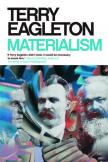Terry Eagleton: a man of many commitments
The meaning of matter, the scope of philosophy and the life of embodied creatures like us are among the topics that Terry Eagleton, the literary theorist and public intellectual, explores in Materialism. While the first chapter categorizes the materialisms on offer in today’s marketplace of ideas, somatic materialism garners most of Eagleton’s attention, since it best describes the approaches of Marx, Nietzsche and Wittgenstein, who each receive a chapter in this short book. Somatic materialists uncover our shared human experience of embodiment as revealed in the reality of agency-cum-dependency that shapes our understanding of the world.
Eagleton calls out atheistic materialism, pokes fun at the contemporary tendency to claim that every need is a natural one and wittily uses Donald J. Trump, Hillary Clinton, Lindsay Lohan and Michael Jackson as examples. Eagleton is at his provocative best when bringing Marx to bear on Nietzsche, amusing us with stories about the enigmatic life of Wittgenstein and deflating puffed-up continental versions of speculative materialism (a view that attempts to animate matter).
Absent, though, are important topics like the mind/body relationship, neuroscience, technology and our relationship to the nonhuman animal. Because Eagleton is concerned only with the universality of the human body (and not its differences), he also leaves the contentious question of gender identity unexamined. Yet, it is Eagleton’s deeply held suspicion of speculative thinking that keeps him from engaging theological approaches that would make his analysis of materialism more meaningful. While he adroitly applies spiritual ideas around the edges (St. Thomas on the soul and the incarnation, St. Paul on the soma,etc.), Eagleton seems only too ready to sideline explorers of dogma and doctrine as merchants of spiritual production, an approach that rules out whole spheres of homo religiosus—contemplation, prayer, thinking and revelation. Eagleton is a man of multiple commitments (only one of which is Christianity); nonetheless, after over 40 books his work is still provocative, learned and captivating.
This article also appeared in print, under the headline “Terry Eagleton: a man of many commitments,” in the June 12, 2017, issue.








